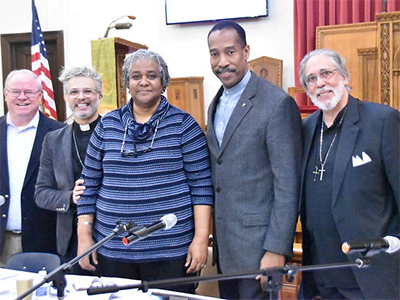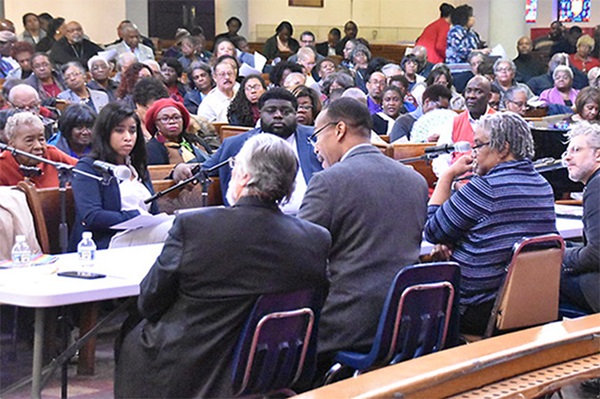More than 600 African American United Methodists from around the Northeastern Jurisdiction convened Jan. 11 in Philadelphia to learn about controversial changes being proposed to the denomination's 2020 legislative General Conference (GC2020).
Your support of The General Administration Fund apportionment implements trustworthy administrative oversight like the General Conference sessions.
The January 11 meeting at historic Tindley Temple UMC came about a week after a major church restructuring proposal was released. That negotiated proposal would divide the church along theological lines, and lead to the departure of many members and churches with traditional beliefs who refuse to change the UMC's doctrine.
 |
| Clergy panelists at the Jan. 11 listening session on GC2020: (from left) Keith Boyette of Virginia; Alex da Silva Souto and Althea Spencer-Miller of New York; Steve Tillett of Annapolis, Md.; and H. Ward Greer of Wilmington, Del. |
The gathering—which was much larger than expected—heard the Rev. Keith Boyette, president of the traditionalist Wesley Covenant Association, describe the new Protocol of Reconciliation & Grace Through Separation, which he helped forge and cosigned.
The Revs. Steve Tillett and H. Ward Greer discussed two petitions that call for debt-forgiveness, reparations and freedom for black churches to disaffiliate from the denomination, with no penalties or payments. Some black church leaders reportedly are exploring possibilities of becoming independent or forming a new denomination.
The lengthy Jubilee Freedom Today petition was submitted to GC2020 in September by the Rev. Fred Allen, recently retired director of the Strengthening the Black Church for the 21st Century (SBC-21) initiative. Allen had convened discussions by black leaders across the church in 2019.
Greer submitted a second, related petition, the Moving Forward/Black Church Disaffiliation Option. It envisions 25 or more black churches creating a "new expression of black Methodism" by December 2024, while retaining church assets and forming their own structure, discipline and apportionment system.
A panel of young adult leaders also spoke to the assembly about how the denomination addresses—or fails to address—their generational needs and concerns now and in the future.
"We as Black United Methodist leaders must be prepared and knowledgeable about the possible changes that may impact our churches," said the Rev. Dennis Blackwell, a New Jersey pastor who led coordination of the listening session. He also serves on the UMC's Judicial Council. "We need wise, informed, prayerful leadership and participation."
Blackwell offered the crowd some ideas for next steps. He urged them to gather and broadly share information, including online links to the various plans. He further encouraged attendees to convene conversations about human sexuality in the black church and about new, alternative expressions of Black Methodism. He also advocated for more black clergy and laity strategy discussions before and after General Conference.
excerpt from a story by John W. Coleman, Conference Communicator, Eastern Pennsylvania Annual Conference
One of seven apportioned giving opportunities of The United Methodist Church, the General Administration Fund implements trustworthy administrative oversight, supports the legislative processes of the church and curates The United Methodist Church's rich history. Please encourage your leaders and congregations to support the General Administration Fund apportionment at 100 percent.





